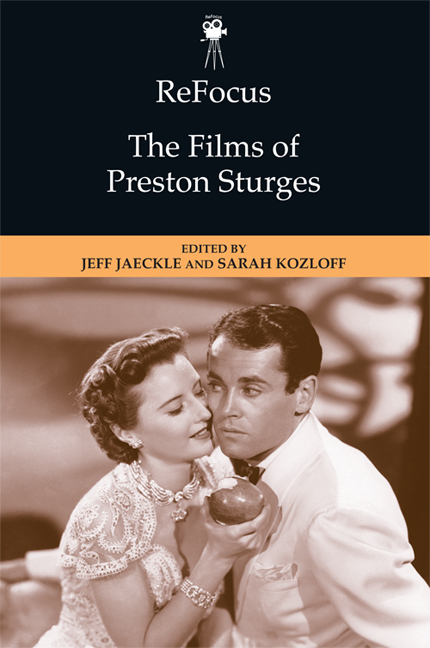Book contents
- Frontmatter
- Contents
- List of Figures
- Notes on Contributors
- Introduction: An Agile Mind—The Many Stands of Preston Sturges
- Part 1 Contexts: Genre, Studio, Authorship
- 1 Preston Sturges and Screwball Comedy
- 2 Preston Sturges, Sullivan's Travels, and Film Authorship in Hollywood, 1941
- 3 To Write and Not Direct
- 4 “The Edge of Unacceptability”: Preston Sturges and the PCA
- Part 2 Cultural Commentary: History and Identity
- Part 3 Technique: Scripting, Performance, Music
- Part 4 Impact: Reception/Reputation
- Index
4 - “The Edge of Unacceptability”: Preston Sturges and the PCA
from Part 1 - Contexts: Genre, Studio, Authorship
Published online by Cambridge University Press: 05 September 2016
- Frontmatter
- Contents
- List of Figures
- Notes on Contributors
- Introduction: An Agile Mind—The Many Stands of Preston Sturges
- Part 1 Contexts: Genre, Studio, Authorship
- 1 Preston Sturges and Screwball Comedy
- 2 Preston Sturges, Sullivan's Travels, and Film Authorship in Hollywood, 1941
- 3 To Write and Not Direct
- 4 “The Edge of Unacceptability”: Preston Sturges and the PCA
- Part 2 Cultural Commentary: History and Identity
- Part 3 Technique: Scripting, Performance, Music
- Part 4 Impact: Reception/Reputation
- Index
Summary
Particular Applications …
II. Sex
The sanctity of the institution of marriage and the home shall be upheld. Pictures shall not infer that low forms of sex relationship are the accepted or common thing …
2. Scenes of Passion
a. They should not be introduced when not essential to the plot.
b. Excessive and lustful kissing, lustful embraces, suggestive postures and gestures, are not to be shown …
3. Seduction or Rape
a. They should never be more than suggested, and only when essential for the plot, and even then never shown by explicit method.
b. They are never the proper subject for comedy.
—Motion Picture Production Code (1930)How did Preston Sturges's major romantic comedies earn seals from the vigilant Joseph I. Breen and the Production Code Administration (PCA)? The films are full of “suggestive postures;” their central topic is often seduction, which is frequently “more than suggested” through staging and dialogue; hints of extramarital sex abound; and the films ridicule “the sanctity of the institution of marriage” into the ground. To quote Elliot Rubenstein, “If Sturges's scenarios don't quite invade the province of the flatly censorable, they surely assault the border outposts, and some of the lines escalate the assault into bombardment.”
Sturges's heroines drive these assaults on the censorable. They embody Kathleen Rowe's unruly women who “[create] disorder by dominating, or trying to dominate, men,” and by being “unable or unwilling” to stay in a women's traditional place. In The Lady Eve (1941), the con artist/cardsharp Jean (Barbara Stanwyck)—having been rejected at the height of an unexpected, exhilarating romance on the high seas—achieves revenge by persuading ale heir Charles “Hopsie” Pike (Henry Fonda) to marry her in disguise and then teaching him a lesson in forgiveness and humility. In The Palm Beach Story (1942), the practical and hardheaded Gerry Jeffers (Claudette Colbert) abandons her poor, hapless inventor husband Tom (Joel McCrea) to pursue marriage with a rich millionaire (Rudy Vallee) who can finance Tom's ridiculous ideas. Trudy Kockenlocker (Betty Hutton) in The Miracle of Morgan's Creek (1944) gets married and pregnant during an all-night goodbye party for departing soldiers; unable to recall what transpired, and even her husband's name, Trudy desperately needs the infatuated Norval Jones (Eddie Bracken) to stand in as her husband and future father of her child(ren).
- Type
- Chapter
- Information
- ReFocus: The Films of Preston Sturges , pp. 83 - 106Publisher: Edinburgh University PressPrint publication year: 2015



